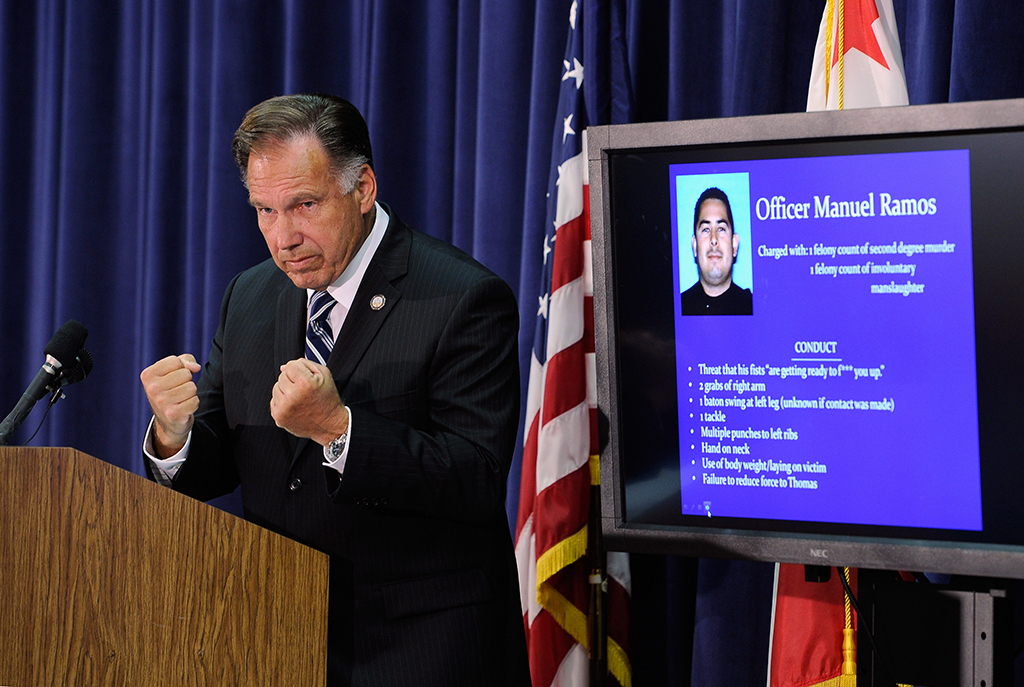California officials used illegal tactics to force confessions from prisoners, lawsuit alleges


Law enforcement in Southern California deliberately ran an illegal jail informant program for years, the American Civil Liberties Union reported Wednesday. Moreover, the officials carefully hid evidence that their methods were unconstitutional, the group claims.
The allegation is revealed in a new lawsuit filed Wednesday by the ACLU. The complaint accuses Orange County District Attorney Tony Rackauckas and Sheriff Sandra Hutchens of depriving defendants of the right to an attorney by using incarcerated informants to coerce confessions from defendants while they're in jail, often through threats of violence.
The ACLU claims that Orange County officials were working together to plant informants in jail to glean information on defendants awaiting trial. Informants facing lengthy prison sentences would agree to seek information in exchange for leniency, reports The Guardian. Officials would then allegedly instruct informants to threaten defendants with violence if they didn't admit to their crimes. "For many, the choice was clear," writes the ACLU. "Confess or die."
Subscribe to The Week
Escape your echo chamber. Get the facts behind the news, plus analysis from multiple perspectives.

Sign up for The Week's Free Newsletters
From our morning news briefing to a weekly Good News Newsletter, get the best of The Week delivered directly to your inbox.
From our morning news briefing to a weekly Good News Newsletter, get the best of The Week delivered directly to your inbox.
The informant program ended in 2014, the ACLU reports, after a former defendant's attorney accused Rackauckas and Hutchens of knowingly breaking the law in an effort to extract information. Rumors of the program have fueled an ongoing scandal for the county in recent years, reports HuffPost, though officials have repeatedly denied any misconduct. While Hutchens has admitted to the use of informants, she maintains that the county acted within legal bounds, saying the improper use of informants was limited to a few rogue deputies rather than a county-sanctioned program.
The use of jailhouse informants is legal if a prisoner offers information unprompted, but a person who has been charged with a crime cannot be questioned by government agents — such as county-appointed informants — without their lawyer present. But the ACLU asserts that "the office is happy to use the illegally extracted information to secure convictions," so long as no one will know "the information was illegally obtained." Read more at the ACLU.
A free daily email with the biggest news stories of the day – and the best features from TheWeek.com
Summer Meza has worked at The Week since 2018, serving as a staff writer, a news writer and currently the deputy editor. As a proud news generalist, she edits everything from political punditry and science news to personal finance advice and film reviews. Summer has previously written for Newsweek and the Seattle Post-Intelligencer, covering national politics, transportation and the cannabis industry.
-
 ABC News to pay $15M in Trump defamation suit
ABC News to pay $15M in Trump defamation suitSpeed Read The lawsuit stemmed from George Stephanopoulos' on-air assertion that Trump was found liable for raping writer E. Jean Carroll
-
 Judge blocks Louisiana 10 Commandments law
Judge blocks Louisiana 10 Commandments lawSpeed Read U.S. District Judge John deGravelles ruled that a law ordering schools to display the Ten Commandments in classrooms was unconstitutional
-
 ATF finalizes rule to close 'gun show loophole'
ATF finalizes rule to close 'gun show loophole'Speed Read Biden moves to expand background checks for gun buyers
-
 Hong Kong passes tough new security law
Hong Kong passes tough new security lawSpeed Read It will allow the government to further suppress all forms of dissent
-
 France enshrines abortion rights in constitution
France enshrines abortion rights in constitutionspeed read It became the first country to make abortion a constitutional right
-
 Texas executes man despite contested evidence
Texas executes man despite contested evidenceSpeed Read Texas rejected calls for a rehearing of Ivan Cantu's case amid recanted testimony and allegations of suppressed exculpatory evidence
-
 Supreme Court wary of state social media regulations
Supreme Court wary of state social media regulationsSpeed Read A majority of justices appeared skeptical that Texas and Florida were lawfully protecting the free speech rights of users
-
 Greece legalizes same-sex marriage
Greece legalizes same-sex marriageSpeed Read Greece becomes the first Orthodox Christian country to enshrine marriage equality in law



